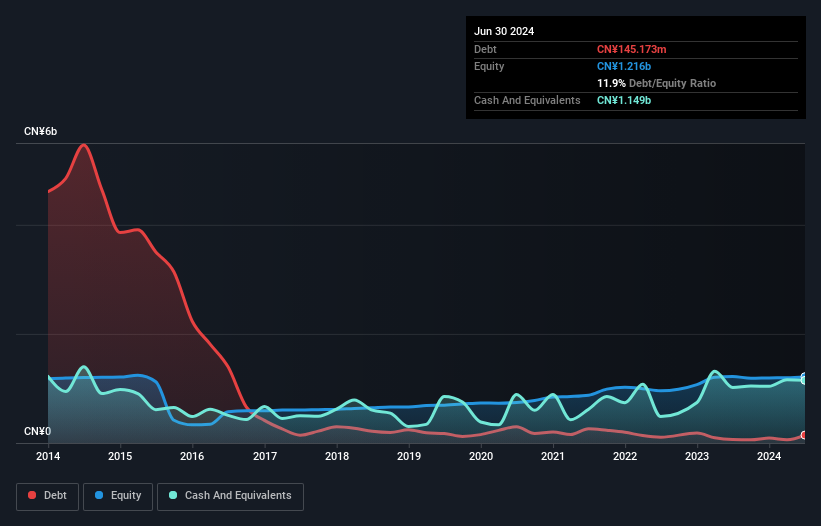These 4 Measures Indicate That Shanghai Material Trading (SHSE:600822) Is Using Debt Reasonably Well
Warren Buffett famously said, 'Volatility is far from synonymous with risk.' So it might be obvious that you need to consider debt, when you think about how risky any given stock is, because too much debt can sink a company. We note that Shanghai Material Trading Co., Ltd. (SHSE:600822) does have debt on its balance sheet. But the more important question is: how much risk is that debt creating?
When Is Debt Dangerous?
Debt and other liabilities become risky for a business when it cannot easily fulfill those obligations, either with free cash flow or by raising capital at an attractive price. Ultimately, if the company can't fulfill its legal obligations to repay debt, shareholders could walk away with nothing. However, a more usual (but still expensive) situation is where a company must dilute shareholders at a cheap share price simply to get debt under control. Of course, debt can be an important tool in businesses, particularly capital heavy businesses. The first step when considering a company's debt levels is to consider its cash and debt together.
See our latest analysis for Shanghai Material Trading
What Is Shanghai Material Trading's Net Debt?
The image below, which you can click on for greater detail, shows that at June 2024 Shanghai Material Trading had debt of CN¥145.2m, up from CN¥62.5m in one year. But it also has CN¥1.15b in cash to offset that, meaning it has CN¥1.00b net cash.

How Healthy Is Shanghai Material Trading's Balance Sheet?
We can see from the most recent balance sheet that Shanghai Material Trading had liabilities of CN¥1.47b falling due within a year, and liabilities of CN¥234.6m due beyond that. Offsetting this, it had CN¥1.15b in cash and CN¥213.4m in receivables that were due within 12 months. So its liabilities outweigh the sum of its cash and (near-term) receivables by CN¥344.8m.
Since publicly traded Shanghai Material Trading shares are worth a total of CN¥3.71b, it seems unlikely that this level of liabilities would be a major threat. But there are sufficient liabilities that we would certainly recommend shareholders continue to monitor the balance sheet, going forward. Despite its noteworthy liabilities, Shanghai Material Trading boasts net cash, so it's fair to say it does not have a heavy debt load!
In fact Shanghai Material Trading's saving grace is its low debt levels, because its EBIT has tanked 65% in the last twelve months. Falling earnings (if the trend continues) could eventually make even modest debt quite risky. There's no doubt that we learn most about debt from the balance sheet. But it is Shanghai Material Trading's earnings that will influence how the balance sheet holds up in the future. So when considering debt, it's definitely worth looking at the earnings trend. Click here for an interactive snapshot.
Finally, while the tax-man may adore accounting profits, lenders only accept cold hard cash. While Shanghai Material Trading has net cash on its balance sheet, it's still worth taking a look at its ability to convert earnings before interest and tax (EBIT) to free cash flow, to help us understand how quickly it is building (or eroding) that cash balance. Over the last two years, Shanghai Material Trading actually produced more free cash flow than EBIT. That sort of strong cash conversion gets us as excited as the crowd when the beat drops at a Daft Punk concert.
Summing Up
While it is always sensible to look at a company's total liabilities, it is very reassuring that Shanghai Material Trading has CN¥1.00b in net cash. The cherry on top was that in converted 1,463% of that EBIT to free cash flow, bringing in CN¥341m. So we don't have any problem with Shanghai Material Trading's use of debt. The balance sheet is clearly the area to focus on when you are analysing debt. But ultimately, every company can contain risks that exist outside of the balance sheet. These risks can be hard to spot. Every company has them, and we've spotted 2 warning signs for Shanghai Material Trading you should know about.
When all is said and done, sometimes its easier to focus on companies that don't even need debt. Readers can access a list of growth stocks with zero net debt 100% free, right now.
Have feedback on this article? Concerned about the content? Get in touch with us directly. Alternatively, email editorial-team (at) simplywallst.com.
This article by Simply Wall St is general in nature. We provide commentary based on historical data and analyst forecasts only using an unbiased methodology and our articles are not intended to be financial advice. It does not constitute a recommendation to buy or sell any stock, and does not take account of your objectives, or your financial situation. We aim to bring you long-term focused analysis driven by fundamental data. Note that our analysis may not factor in the latest price-sensitive company announcements or qualitative material. Simply Wall St has no position in any stocks mentioned.
 Index Options
Index Options CME Group
CME Group Nasdaq
Nasdaq Cboe
Cboe TradingView
TradingView Wall Street Journal
Wall Street Journal